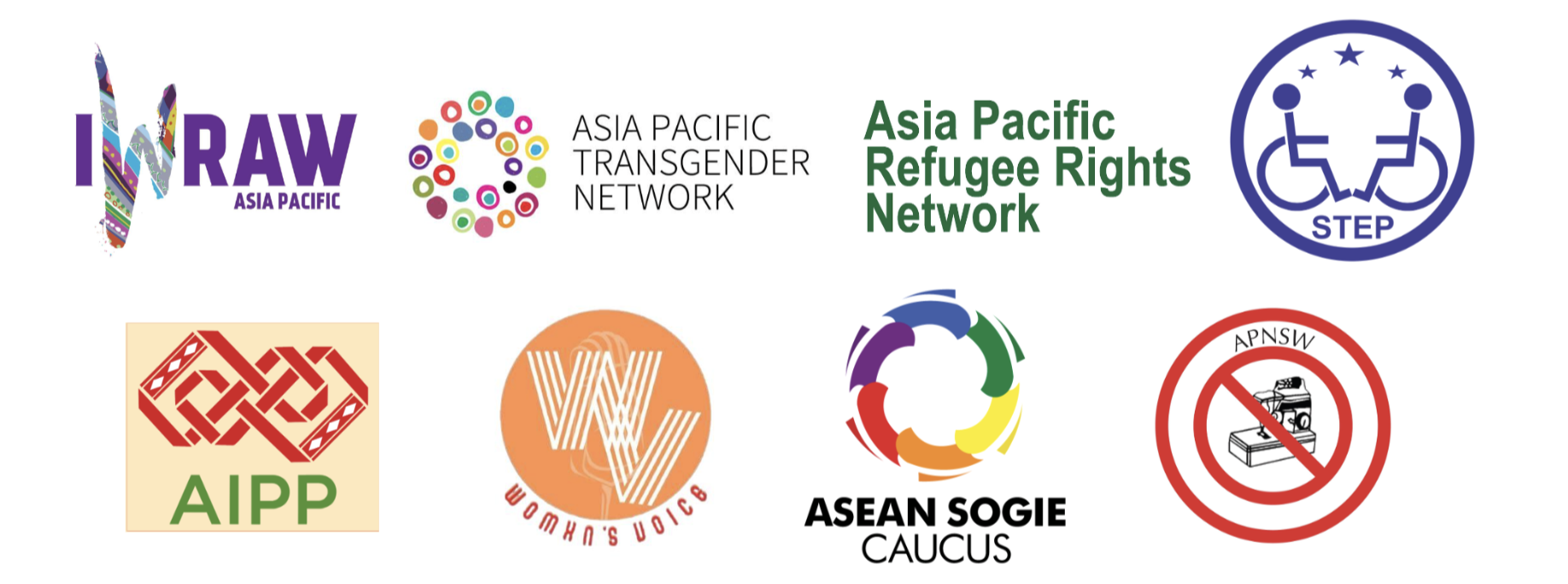
On April 1, 2021, International Women’s Rights Action Watch Asia Pacific (IWRAW), Asia Pacific Transgender Network (APTN) and six other organisations joined the Forging Intersectional Feminist Futures (FIFF) consortium. This consortium focuses on strengthening the international movement in Asia as the key to accomplishing systematic gender equality. FIFF has three outcomes expected, which are a strengthened collective understanding of intersectionality and intersectional feminism among nine key networks and organisations working to eradicate gender inequality in Asia, a crossing-movement roadmap for joint advocacy outlining intersectional entry points for collective action towards eliminating gender inequality, including specific CEDAW-based research, and documented good practices and strategies for applying an intersectional approach to eliminating gender inequality in Asia.
In this consortium, APTN will lead the project country programme in Cambodia and lead regional and consortium activities including the workshop to develop the cross-movement advocacy roadmap and communications.
Eight Consortium Partners
Asia Pacific Network of Sex Workers (APNSW)
APNSW is a sex worker-initiated and led organisation representing sex worker organisations in Asia & the Pacific. APNSW members include National sex workers networks, sex worker-run organisations and sex worker projects representing male, female and transgender sex workers. All APNSW members share the same core beliefs that sex work is work and that sex workers should lead their organisations and projects.
ASEAN SOGIE Caucus (ASC)
The ASEAN SOGIE Caucus (ASC) is a network of human rights activists from Southeast Asia. The ASC works for the inclusion of Sexual Orientation, Gender Identity, Gender Expression, and Sex Characteristics (SOGIESC) in the mandate of human rights duty bearers in the ASEAN region. The ASC works for the promotion and protection of the human rights of all persons regardless of SOGIESC in the Southeast Asian region.
International Drug Policy Consortium (IDPC) Asia
The International Drug Policy Consortium (IDPC) is a global network that works collectively to promote person-centred, rights-affirming drug policies at the national, regional and international levels.
The IDPC network has over 190 members from all over the world with broad and diverse expertise, including community-led networks, grassroots groups, advocacy NGOs, as well as major international organisations.
The network is a strong, collaborative initiative and a trusted source of expertise on drug policy reform. IDPC’s Secretariat, with staff based in London, Bangkok and Accra, supports the network with communications, building the evidence, capacity strengthening and coordination of advocacy efforts.
Special Talent Exchange Programme (STEP)
STEP is envisioned to advocate society for the rights of persons with disabilities; lobbying with policymakers in the public, private and development sectors for the inclusion of persons with disabilities in the overall development process; raising awareness and conducting consultations for the empowerment of persons with debilitates; counselling development of accessible environment; and promoting accessible information by creating a bridge between persons with debilitates and facilities of health, education and livelihood.
Asia Indigenous Peoples Pact (AIPP)
The Asia Indigenous Peoples Pact (AIPP) is a regional organization founded in 1992 by indigenous peoples’ movements. AIPP is committed to the cause of promoting and defending indigenous peoples’ rights and human rights and articulating issues of relevance to indigenous peoples. At present, AIPP has 46 members from 14 countries in Asia with 18 indigenous peoples’ national alliances/networks (national formations), and 30 local and sub-national organizations. Of this number, 16 are ethnic-based organizations, six are indigenous women and four are indigenous youth organizations and one organization of indigenous persons with disabilities.
Asia Pacific Refugee Rights Network
APRRN was formed in 2008 at a regional conference on refugee rights, held in Malaysia, in which representatives of 70 civil society organisations from 14 countries determined the need for a coordinating entity to convene collaborative action to advance refugee rights across the Asia Pacific region.
Asia Region of the International Lesbian, Gay, Bisexual, Trans and Intersex Association
ILGA Asia is the Asian Region of ILGA World, representing more than 100 member organizations in Afghanistan, Bahrain, Bangladesh, Bhutan, Brunei Darussalam, Cambodia, China, Democratic People’s Republic of Korea, India, Indonesia, Islamic Republic of Iran, Iraq, Israel, Japan, Jordan, Kuwait, Lao People’s Democratic Republic, Lebanon, Malaysia, Maldives, Mongolia, Myanmar, Nepal, Oman, Palestine, Pakistan, Philippines, Qatar, Republic of Korea, Saudi Arabia, Singapore, Sri Lanka, Syrian Arab Republic, Taiwan, Thailand, Timor-Leste, United Arab Emirates, Viet Nam and Yemen.
Their vision is a world where Asia is a safe place for all, where all can live in freedom and equality, be properly informed in the nature of sexual orientation and gender identity & expression and sex characteristic (SOGIESC) rights, have access to justice, and diversity is respected.
Due to COVID-19 and related restrictions, activities which took place over the first 18 months were organised virtually. And in 2021, APTN with Asia Pacific Network of Sex Workers (APNSW), ASEAN SOGIE Caucus (ASC), International Drug Policy Consortium (IDPC), and Special Talent Exchange Programme (STEP) were working on the national opening partnership dialogues. This activity has an expected outcome to cross-movement roadmap for joint advocacy outlining intersectional entry points for collective action towards eliminating gender inequality, including specific CEDAW-based research and advocacy actions. National opening partnership dialogues will allow the project partners to join together and share their substantive/ programmatic priority areas so they can understand each other’s work. And this activity was facilitated by an external resource person.
